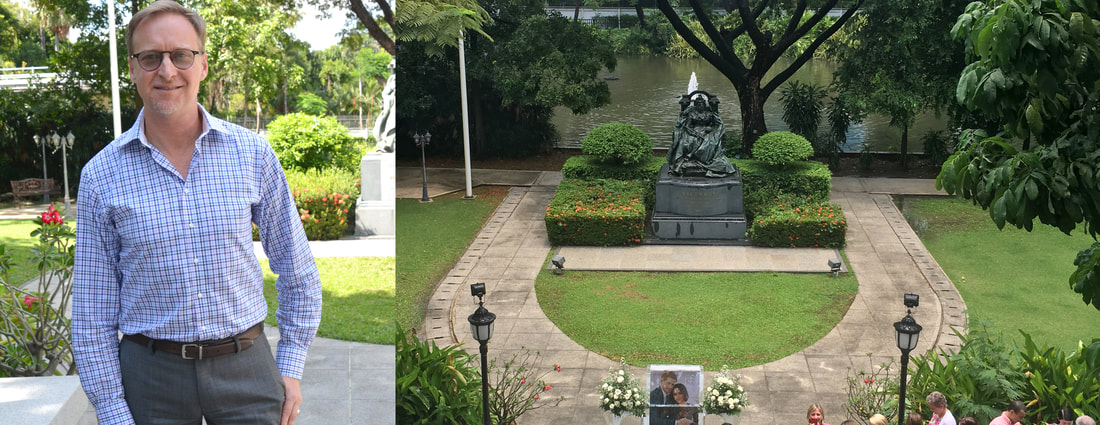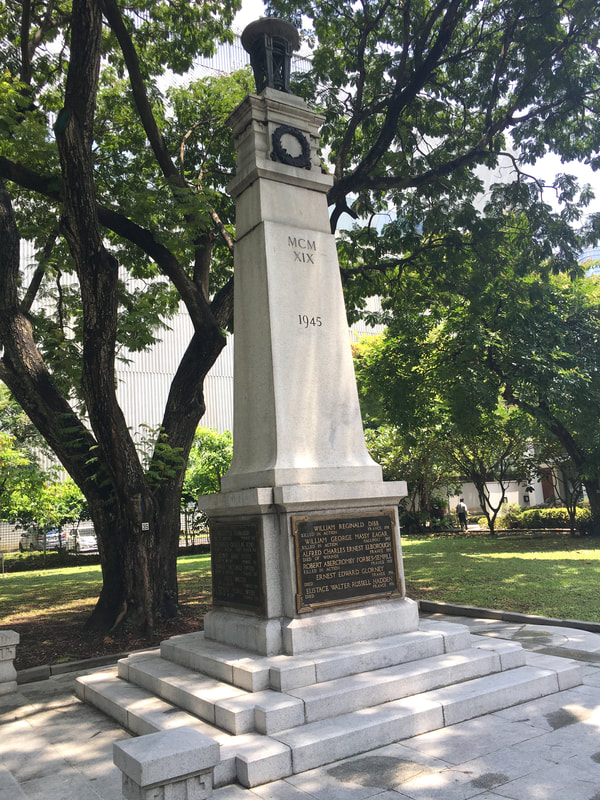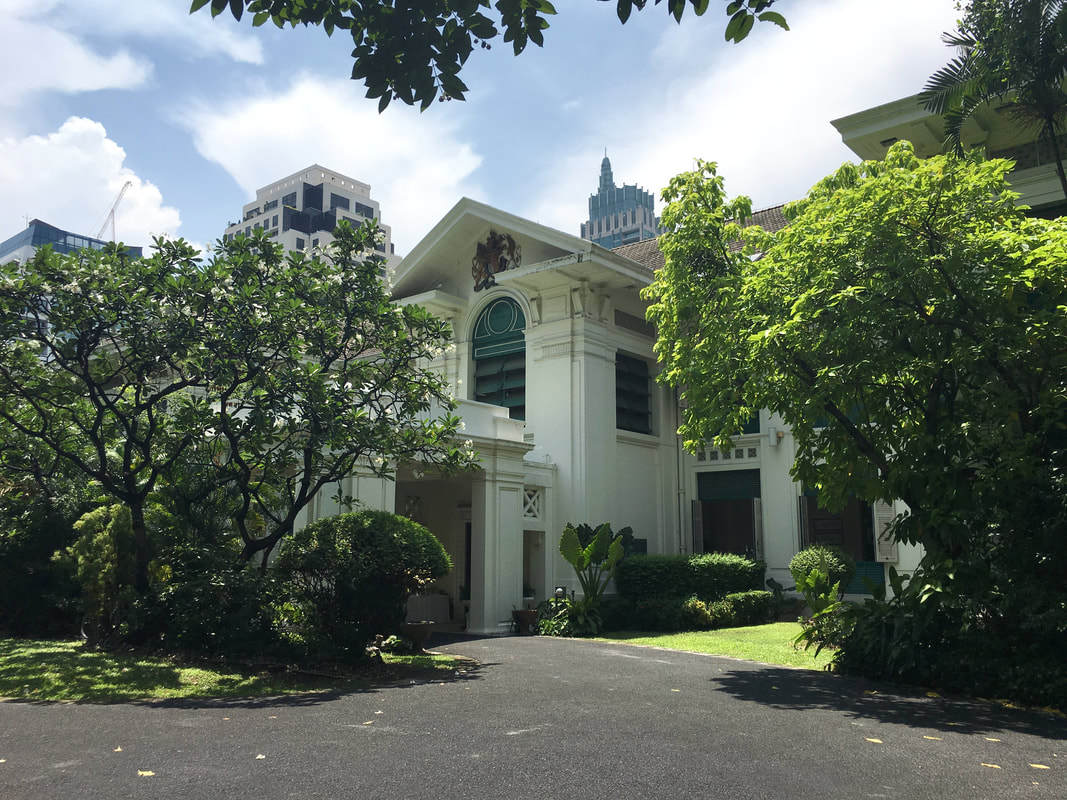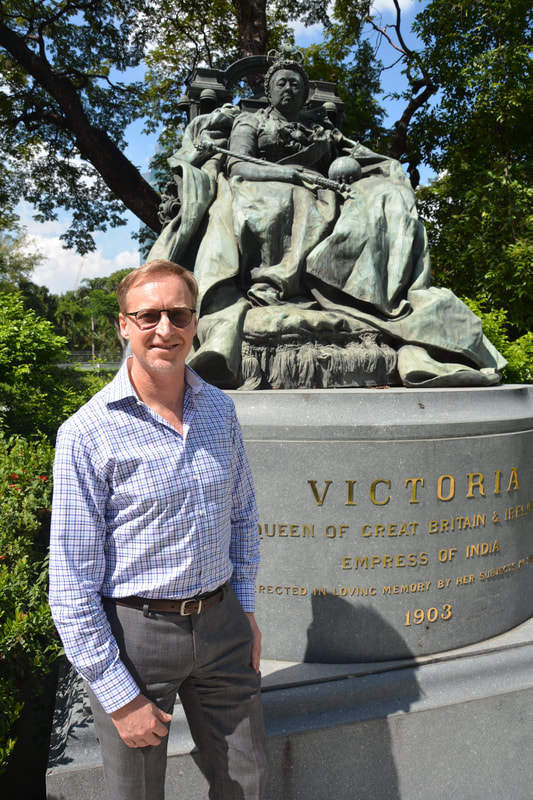“Judge us instead on what we’re doing in Thailand”
Demise of century-old building and compound still angers British community as embassy staff prepare to relocate to an office building on Sathorn Road
By Colin Hastings
Demise of century-old building and compound still angers British community as embassy staff prepare to relocate to an office building on Sathorn Road
By Colin Hastings
| With the clock winding down on the closure of the much-admired British embassy and its resplendent compound in the heart of Bangkok, Ambassador Brian Davidson is not only maintaining a diplomatic stiff upper lip on its imminent demise after almost 100 years, but is also managing to put a positive spin on the situation, insisting that it marks the beginning of a new and more meaningful relationship with Thailand. “The sale of the embassy is done and we have to look forward. I see this as an opportunity, to create a new embassy that has to be all about modern Thailand. And it’s my job to make the move as efficient as possible,” says the ambassador. “From now on it’s all about how we work and develop as an embassy. This is a year of transition – getting the deal right, and getting it done. “Of course I feel sad about the embassy’s closure, and I will miss this place – it would strange not to feel a sense of history,” concedes Mr Davidson, now into his third year as Britain’s top envoy in the kingdom. The ambassador rejects claims that the loss of the embassy will affect the UK’s prestige and standing in Thailand. “Prestige is nebulous and we should be judged instead on what we’re doing here. Our relationship with Thailand is getting deeper – and that’s not just a perception. We’re as committed as ever.” |
That commitment includes a number of semi-secret joint Thai- British initiatives covering trafficking of wildlife, missing persons and sex offenders. A Border Force comprised of a team of 12 local and UK-based staff is currently working with Thai customs officers on training, equipping and mentoring to help out on key issues. A similar-sized team from the UK’s National Crime Agency is also based at the embassy. “We carry out these activities quietly because of the nature of the work,” explains the ambassador.
Also planned at the embassy is the second edition of an in-house forum the ambassador calls ‘Speakers Corner’ which aims to open up a “soap box debate” amongst specially invited young Thais on a range of issues. “The focus is on free and fair discussion on different challenges and rights to support healthy democratic development. We want to demonstrate how we function in the UK on a number of topics.”
This initiative is part of a call from Britain’s Foreign Secretary Jeremy Hunt for greater media freedom and the development of democracy in response to last year’s murder of Saudi dissident Jamal Khashoggi, according to the ambassador.
Scheduled to open at the end of this year, the replacement British embassy will be housed on three floors in the AIA complex, a dull non-descript office building on Sathorn Road, some three kilometers and a somewhat greater distance emotionally from the green and pleasant gardens, mature trees and lakes of its current site on Wireless Road.
Rallying to the cause, Mr Davidson says the new embassy will incorporate a number of key improvements over its hugely popular predecessor, which is used regularly as a venue for official and private functions, including most notably – as far as expats are concerned – the annual Ploenchit Fair.
“It’s a better, more practical space,” he says of the Sathorn Road embassy. “We have a large office so we can accommodate up to 150 people for business meetings and social events. For anything larger, we can try out other venues. It’s a work in progress.”
Sitting on a wickerwork sofa in the elegant all-white meeting room in what remains for a few months longer his official residence, the ambassador surveys the scene around him and comments: “This place has many challenges, things like poor wifi, air-conditioning and acoustics. Then there’s the cost of constant repairs and upkeep of the buildings and gardens.”
The sale of the embassy continues to grate with the local British community and local conservationists, who fought hard to convince the British government to change its mind. During a visit to Thailand last year, the then Foreign Minister Boris Johnson expressed his regrets when speaking to a group of British residents. He was not alone. Many others see it as yet further proof of Britain’s once mighty presence overseas on the slide.
Also planned at the embassy is the second edition of an in-house forum the ambassador calls ‘Speakers Corner’ which aims to open up a “soap box debate” amongst specially invited young Thais on a range of issues. “The focus is on free and fair discussion on different challenges and rights to support healthy democratic development. We want to demonstrate how we function in the UK on a number of topics.”
This initiative is part of a call from Britain’s Foreign Secretary Jeremy Hunt for greater media freedom and the development of democracy in response to last year’s murder of Saudi dissident Jamal Khashoggi, according to the ambassador.
Scheduled to open at the end of this year, the replacement British embassy will be housed on three floors in the AIA complex, a dull non-descript office building on Sathorn Road, some three kilometers and a somewhat greater distance emotionally from the green and pleasant gardens, mature trees and lakes of its current site on Wireless Road.
Rallying to the cause, Mr Davidson says the new embassy will incorporate a number of key improvements over its hugely popular predecessor, which is used regularly as a venue for official and private functions, including most notably – as far as expats are concerned – the annual Ploenchit Fair.
“It’s a better, more practical space,” he says of the Sathorn Road embassy. “We have a large office so we can accommodate up to 150 people for business meetings and social events. For anything larger, we can try out other venues. It’s a work in progress.”
Sitting on a wickerwork sofa in the elegant all-white meeting room in what remains for a few months longer his official residence, the ambassador surveys the scene around him and comments: “This place has many challenges, things like poor wifi, air-conditioning and acoustics. Then there’s the cost of constant repairs and upkeep of the buildings and gardens.”
The sale of the embassy continues to grate with the local British community and local conservationists, who fought hard to convince the British government to change its mind. During a visit to Thailand last year, the then Foreign Minister Boris Johnson expressed his regrets when speaking to a group of British residents. He was not alone. Many others see it as yet further proof of Britain’s once mighty presence overseas on the slide.
Questions about which British politician was responsible for the decision to offload this magnificent asset are frequently asked by disgruntled Brits in Thailand. Usually the finger of blame is pointed at George Osborne or Philip Hammond, Britain’s past and current Chancellor of the Exchequer.
Mr Davidson declines to name either politician, but does offer a diplomatic justification for the sale, saying that it’s been on the cards for many years. “Estate matters such as British embassies across the world “soap box debate” amongst specially invited young Thais on a range of issues. “The focus is on free and fair discussion on different challenges and rights to support healthy democratic development. We want to demonstrate how we function in the UK on a number of topics.”
This initiative is part of a call from Britain’s Foreign Secretary Jeremy Hunt for greater media freedom and the development of democracy in response to last year’s murder of Saudi dissident Jamal Khashoggi, according to the ambassador.
Scheduled to open at the end of this year, the replacement British embassy will be housed on three floors in the AIA complex, a dull non-descript office building on Sathorn Road, some three kilometers and a somewhat greater distance emotionally from the come up periodically for discussion by the Foreign Office and there’s no doubt this embassy was often mentioned. It is ten times more valuable than the FO’s next asset, so it’s impossible not to argue about the space. What I can say is that is the final decision was made during my first two years here.”
The ambassador is also cool on the notion that prime property is a good long-term investment, noting that cash is needed to fund ongoing FO projects.
In a concession to the historical importance of the British embassy, its new owners, the Central Group, have agreed to build an exact replica of the ambassador’s historical residence, complete with original features, as part of their plans for the Wireless Road site. A place will also be kept for the embassy’s iconic statue of Britain’s Queen Victoria, while the war memorial will be relocated to the British Club of Bangkok.
The ambassador will get a new home on the upper floors of the Four Seasons Private Residence, one of Bangkok’s most luxurious freehold condominiums. He and his family will be sharing the views over the Chao Phraya River with some of the city’s most serious A-listers as neighbors. The move will take place in August this year.
The embassy’s shift to Sathorn Road will probably result in additional staff, says the ambassador. The Trade Section, for example, is expected to increase from nine to 15 staff, partly in response to changes expected from Brexit.
“Post-Brexit will bring new opportunities, so we have to be ready. At the same time, we want to make it clear to Thailand and the rest of ASEAN that Britain is not withdrawing from the world – we want to let them know what the UK is doing,” says Mr Davidson, who has extended his stay by an extra year to oversee the embassy relocation.
On other matters…
Mr Davidson declines to name either politician, but does offer a diplomatic justification for the sale, saying that it’s been on the cards for many years. “Estate matters such as British embassies across the world “soap box debate” amongst specially invited young Thais on a range of issues. “The focus is on free and fair discussion on different challenges and rights to support healthy democratic development. We want to demonstrate how we function in the UK on a number of topics.”
This initiative is part of a call from Britain’s Foreign Secretary Jeremy Hunt for greater media freedom and the development of democracy in response to last year’s murder of Saudi dissident Jamal Khashoggi, according to the ambassador.
Scheduled to open at the end of this year, the replacement British embassy will be housed on three floors in the AIA complex, a dull non-descript office building on Sathorn Road, some three kilometers and a somewhat greater distance emotionally from the come up periodically for discussion by the Foreign Office and there’s no doubt this embassy was often mentioned. It is ten times more valuable than the FO’s next asset, so it’s impossible not to argue about the space. What I can say is that is the final decision was made during my first two years here.”
The ambassador is also cool on the notion that prime property is a good long-term investment, noting that cash is needed to fund ongoing FO projects.
In a concession to the historical importance of the British embassy, its new owners, the Central Group, have agreed to build an exact replica of the ambassador’s historical residence, complete with original features, as part of their plans for the Wireless Road site. A place will also be kept for the embassy’s iconic statue of Britain’s Queen Victoria, while the war memorial will be relocated to the British Club of Bangkok.
The ambassador will get a new home on the upper floors of the Four Seasons Private Residence, one of Bangkok’s most luxurious freehold condominiums. He and his family will be sharing the views over the Chao Phraya River with some of the city’s most serious A-listers as neighbors. The move will take place in August this year.
The embassy’s shift to Sathorn Road will probably result in additional staff, says the ambassador. The Trade Section, for example, is expected to increase from nine to 15 staff, partly in response to changes expected from Brexit.
“Post-Brexit will bring new opportunities, so we have to be ready. At the same time, we want to make it clear to Thailand and the rest of ASEAN that Britain is not withdrawing from the world – we want to let them know what the UK is doing,” says Mr Davidson, who has extended his stay by an extra year to oversee the embassy relocation.
On other matters…
| CORONATION: The embassy is currently in discussion with the UK on which members of Britain’s royal family will represent the country at the Coronation of King Vajiralongkorn on May 4-6, 2019. EMBASSY COMPLAINTS: The embassy takes any complaints about its work in Thailand very seriously and works hard to fix them, says Mr Davison. “There are still lots of misunderstanding about what we can do. Some people have unrealistic expectations. We can’t get someone out of jail, for example, but we can help with lawyers. “People don’t like being told that there’s nothing the government can do. We’re honest, there’s no point in pretending to be otherwise. We can’t make a problem go away. “With a million tourists here every year, our consular section is very busy. In fact, it’s second only to Spain. “I thoroughly reject any accusation that we lack empathy. Our consular teams have most unpleasant tasks – rape and sexual assault, child care, and gruesome road accidents that make up a third of our consular cases. It’s the daily fare for them. And they do it with care and passion. Yes, I do get defensive on this issue because they’re an extraordinary group.” FAMILY MAN: Mr Davidson married his husband, Scott, in 2014 in one of the first same-sex marriages performed at the British Embassy Beijing. They have two children – Eliot (2), Esme (1) and another baby expected on March 8, 2019. All the children have a surrogate mother based in California and were conceived using three different egg donors of Chinese ethnicity. The ambassador will take three months’ parental leave on the birth of his third child but will remain in Thailand. |
CHINA: The world’s most populous nation will become its biggest economy and the UK needs to work out how it can take advantage of the opportunities, says Mr Davidson, who served a total of 13 years on two separate diplomatic assignments in China. “We have to demonstrate the quality of what we have and not to be afraid of the competition.”
Thailand has a very balanced view of China, and its One Belt One Road strategy does not pose a threat to this country, says the ambassador.
EASTERN ECONOMIC CORRIDOR: The British embassy is trying to unravel the complexities of Thailand’s massive EEC plan, which to date has seen considerable Chinese and Japanese involvement but fewer opportunities for British companies. “We’re not clear of the project’s mechanics and our job is to get some clarity from all the rhetoric. The EEC is an ambitious undertaking and it will make a big difference to Thailand.
“We’re currently lobbying the government, which will be boosted by the visit soon of Mark Field, Minister of State at the Foreign Office.”
The ambassador rejects rumours that some countries are receiving preferential treatment on the project.
Thailand has a very balanced view of China, and its One Belt One Road strategy does not pose a threat to this country, says the ambassador.
EASTERN ECONOMIC CORRIDOR: The British embassy is trying to unravel the complexities of Thailand’s massive EEC plan, which to date has seen considerable Chinese and Japanese involvement but fewer opportunities for British companies. “We’re not clear of the project’s mechanics and our job is to get some clarity from all the rhetoric. The EEC is an ambitious undertaking and it will make a big difference to Thailand.
“We’re currently lobbying the government, which will be boosted by the visit soon of Mark Field, Minister of State at the Foreign Office.”
The ambassador rejects rumours that some countries are receiving preferential treatment on the project.
IMPROVED RELATIONS:
Relations with Thailand’s military government, frozen after the coup in 2014, were normalized a year ago, with Prime Minister Prayut Chan-o-cha receiving the red carpet treatment on a visit to London. “We need to be in a position to talk to the government on a day to day basis,” says the ambassador. On the whereabouts of wanted fugitives Red Bull heir Vorayuth Yoovidhya and former deposed Thai prime minister Yingluck Shinawatra, both of whom are rumoured to have spent time in the UK, Mr Davidson says he has no idea.
DEATH OF KING POWER OWNER:
the embassy has yet to receive updates on the helicopter crash in the UK last October that killed Vichai Srivaddhanaprabha, founder of King Power Duty Free and Leicester City Football Club. “We haven’t seen anything so far, and wouldn’t necessarily get and reports. Investigations like this take a long time.”
PUPILS CAMBRIDGE BOUND: Describing the news that six pupils from Shrewsbury International School Bangkok have received offers from Cambridge University as “fantastic,” the ambassador added with obvious pride: “British education is not just about the quality of teaching, but also about life skills and preparing the students for today’s world. This is what distinguishes British education.”
UK PENSIONS: Bad news for British pensioners living in Thailand. There’s no movement on unfreezing their pension payments while a reciprocal social security agreement with Thailand remains in place. “But we will mention this issue to the next senior government visitor,” promised the ambassador.
Relations with Thailand’s military government, frozen after the coup in 2014, were normalized a year ago, with Prime Minister Prayut Chan-o-cha receiving the red carpet treatment on a visit to London. “We need to be in a position to talk to the government on a day to day basis,” says the ambassador. On the whereabouts of wanted fugitives Red Bull heir Vorayuth Yoovidhya and former deposed Thai prime minister Yingluck Shinawatra, both of whom are rumoured to have spent time in the UK, Mr Davidson says he has no idea.
DEATH OF KING POWER OWNER:
the embassy has yet to receive updates on the helicopter crash in the UK last October that killed Vichai Srivaddhanaprabha, founder of King Power Duty Free and Leicester City Football Club. “We haven’t seen anything so far, and wouldn’t necessarily get and reports. Investigations like this take a long time.”
PUPILS CAMBRIDGE BOUND: Describing the news that six pupils from Shrewsbury International School Bangkok have received offers from Cambridge University as “fantastic,” the ambassador added with obvious pride: “British education is not just about the quality of teaching, but also about life skills and preparing the students for today’s world. This is what distinguishes British education.”
UK PENSIONS: Bad news for British pensioners living in Thailand. There’s no movement on unfreezing their pension payments while a reciprocal social security agreement with Thailand remains in place. “But we will mention this issue to the next senior government visitor,” promised the ambassador.
China Expert
Brian Davidson has been British Ambassador to Thailand since June 2016. He has extensive experience in Asia, having started his career in Beijing (1988-1992) and most recently served as Consul General in Guangzhou and then Shanghai between 2006-2015. Other overseas posts have included Lithuania and Australia. While in the UK Brian has worked for the Cabinet Office as an analyst on international terrorism and on secondment to International Financial Services London as Deputy Chief Executive.
Brian holds a Bachelor’s degree in Law from Cambridge University.
He speaks Mandarin Chinese, French and rusty Lithuanian and is currently studying Thai. Brian married his husband, Scott, in 2014. They have two children, and a third expected in March 2019.
British Ambassador to Thailand
The Ambassador represents Her Majesty The Queen and the UK government in the country to which they are appointed. They are responsible for the direction and work of the Embassy and its Consulates, including political work, trade and investment, press and cultural relations, and visa and consular services.
Brian Davidson has been British Ambassador to Thailand since June 2016. He has extensive experience in Asia, having started his career in Beijing (1988-1992) and most recently served as Consul General in Guangzhou and then Shanghai between 2006-2015. Other overseas posts have included Lithuania and Australia. While in the UK Brian has worked for the Cabinet Office as an analyst on international terrorism and on secondment to International Financial Services London as Deputy Chief Executive.
Brian holds a Bachelor’s degree in Law from Cambridge University.
He speaks Mandarin Chinese, French and rusty Lithuanian and is currently studying Thai. Brian married his husband, Scott, in 2014. They have two children, and a third expected in March 2019.
British Ambassador to Thailand
The Ambassador represents Her Majesty The Queen and the UK government in the country to which they are appointed. They are responsible for the direction and work of the Embassy and its Consulates, including political work, trade and investment, press and cultural relations, and visa and consular services.





 RSS Feed
RSS Feed
















